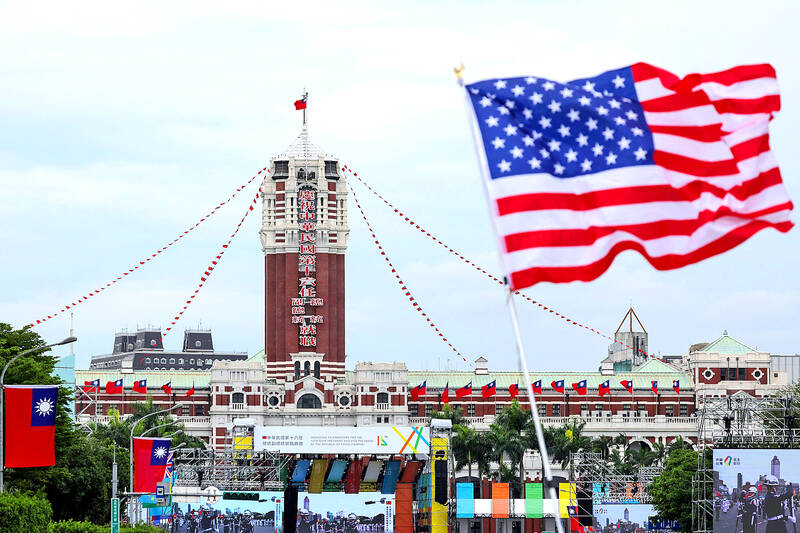The US and Japanese governments congratulated President William Lai (賴清德) on taking office yesterday while affirming close ties with Taiwan.
US Secretary of State Antony Blinken issued a statement congratulating Lai on his inauguration and “the Taiwan people for once again demonstrating the strength of their robust and resilient democratic system.”
“The partnership between the American people and the Taiwan people, rooted in democratic values, continues to broaden and deepen across trade, economic, cultural, and people-to-people ties,” Blinken said.

Photo: Yasuyoshi Chiba, AFP
He also commended former president Tsai Ing-wen (蔡英文) for her efforts in bolstering ties between Washington and Taipei during the eight years she was in office.
“We look forward to working with President Lai and across Taiwan’s political spectrum to advance our shared interests and values, deepen our longstanding unofficial relationship, and maintain peace and stability across the Taiwan Strait,” Blinken said.
In Taipei, the Ministry of Foreign Affairs thanked Blinken for again publicly supporting a free and democratic Taiwan, following the congratulatory message he sent after the nation’s presidential election in January.
The statement demonstrated the “rock-solid” relations between Taiwan and the US, and a partnership based on shared values, the ministry said.
The new government would build on the existing solid foundation and continue to work with the US to bolster cooperation in several fields, and safeguard peace, stability and prosperity in the Indo-Pacific region, it added.
Meanwhile, Japanese Chief Cabinet Secretary Yoshimasa Hayashi congratulated Lai and Vice President Hsiao Bi-khim (蕭美琴) on their inauguration at a regular news briefing yesterday.
“Taiwan is an extremely important partner and dear friend of our country, with whom we share fundamental values and have close economic ties and people-to-people exchanges,” Hayashi said.
The Japanese government would continue to deepen cooperation and exchanges with Taiwan based on a “non-governmental practical relationship,” he said.
The two sides have supported each other through difficult situations such as the COVID-19 pandemic, and the major earthquakes that struck Japan’s Noto Peninsula and Hualien earlier this year, Hayashi said.
Tokyo is looking forward to deepening the friendship with Taipei under Lai’s leadership, he added.

AT RISK: The council reiterated that people should seriously consider the necessity of visiting China, after Beijing passed 22 guidelines to punish ‘die-hard’ separatists The Mainland Affairs Council (MAC) has since Jan. 1 last year received 65 petitions regarding Taiwanese who were interrogated or detained in China, MAC Minister Chiu Chui-cheng (邱垂正) said yesterday. Fifty-two either went missing or had their personal freedoms restricted, with some put in criminal detention, while 13 were interrogated and temporarily detained, he said in a radio interview. On June 21 last year, China announced 22 guidelines to punish “die-hard Taiwanese independence separatists,” allowing Chinese courts to try people in absentia. The guidelines are uncivilized and inhumane, allowing Beijing to seize assets and issue the death penalty, with no regard for potential

STILL COMMITTED: The US opposes any forced change to the ‘status quo’ in the Strait, but also does not seek conflict, US Secretary of State Marco Rubio said US President Donald Trump’s administration released US$5.3 billion in previously frozen foreign aid, including US$870 million in security exemptions for programs in Taiwan, a list of exemptions reviewed by Reuters showed. Trump ordered a 90-day pause on foreign aid shortly after taking office on Jan. 20, halting funding for everything from programs that fight starvation and deadly diseases to providing shelters for millions of displaced people across the globe. US Secretary of State Marco Rubio, who has said that all foreign assistance must align with Trump’s “America First” priorities, issued waivers late last month on military aid to Israel and Egypt, the

‘UNITED FRONT’ FRONTS: Barring contact with Huaqiao and Jinan universities is needed to stop China targeting Taiwanese students, the education minister said Taiwan has blacklisted two Chinese universities from conducting academic exchange programs in the nation after reports that the institutes are arms of Beijing’s United Front Work Department, Minister of Education Cheng Ying-yao (鄭英耀) said in an exclusive interview with the Chinese-language Liberty Times (the Taipei Times’ sister paper) published yesterday. China’s Huaqiao University in Xiamen and Quanzhou, as well as Jinan University in Guangzhou, which have 600 and 1,500 Taiwanese on their rolls respectively, are under direct control of the Chinese government’s political warfare branch, Cheng said, citing reports by national security officials. A comprehensive ban on Taiwanese institutions collaborating or

France’s nuclear-powered aircraft carrier and accompanying warships were in the Philippines yesterday after holding combat drills with Philippine forces in the disputed South China Sea in a show of firepower that would likely antagonize China. The Charles de Gaulle on Friday docked at Subic Bay, a former US naval base northwest of Manila, for a break after more than two months of deployment in the Indo-Pacific region. The French carrier engaged with security allies for contingency readiness and to promote regional security, including with Philippine forces, navy ships and fighter jets. They held anti-submarine warfare drills and aerial combat training on Friday in